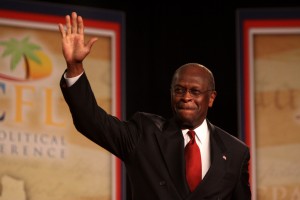It’s only noon on Monday, but it already seems like it’s not going to be Herman Cain’s week. On Sunday, Politico broke the story on allegations of sexual harassment leveled at Cain during his time as head of the National Restaurant Association (NRA). Sources say that “sexually suggestive behavior by Cain” made them “angry and uncomfortable.” According to the story, the women signed agreements with the NRA that gave them monetary payouts to leave the association. The terms of these agreements bar the women from speaking publicly about the reason for their departure.
The question, of course, is what these allegations will do to Cain’s rapidly burgeoning political career. Cain, who has been profiting in the polls from Mitt Romney and Rick Perry’s weaknesses, is especially popular among white evangelical Protestants, a core Republican constituency. Cain’s chief of staff, Mark Block, went on MSNBC to deny that Cain has ever sexually harassed “anybody,” and Cain himself says the accusations are “baseless.”
There may be some hope for Cain yet, even if the allegations are proven true. Most Americans view financial misconduct as a more serious moral problem for elected officials than sexual misconduct (although a new report from Wisconsin suggests that a non-profit run by Block was paying for Cain’s campaign expenses after Cain had set up his official presidential campaign committee, a tactic that runs afoul of campaign finance rules).
According to a PRRI survey conducted this summer, 91% of Americans say that taking a bribe is a very serious moral problem, while 81% say the same if an elected official does not report all of their income on their taxes. By comparison, two-thirds (67% and 66%, respectively) say that sending sexually explicit messages to someone other than their spouse and having sex with a prostitute are very serious moral problems.
But religious affiliation could make a difference, especially for Cain’s key constituency. While Americans as a whole are divided over whether they think an elected official who behaves immorally in his or her personal life can still behave ethically in public life (44% agree and 44% disagree), white evangelical Protestants do not make such a distinction. Nearly two-thirds (64%) say that an elected official who commits an immoral act in their personal life cannot behave ethically in their public life.
This revelation could once again change the trajectory of GOP primary. If the allegations are proven true, will white evangelical Protestants forgive Herman Cain? Penny Nance, the president of Concerned Women for America, a conservative Christian women’s group, has already called for answers from Cain. Speaking about her own experience with sexual harassment in the workplace, Nance told Politico: “I know in a very personal way that sexual harassment exists and that it’s demeaning and painful. It should never be tolerated in the workforce and certainly not the White House.” The numbers indicate that many white evangelical Protestants agree.
